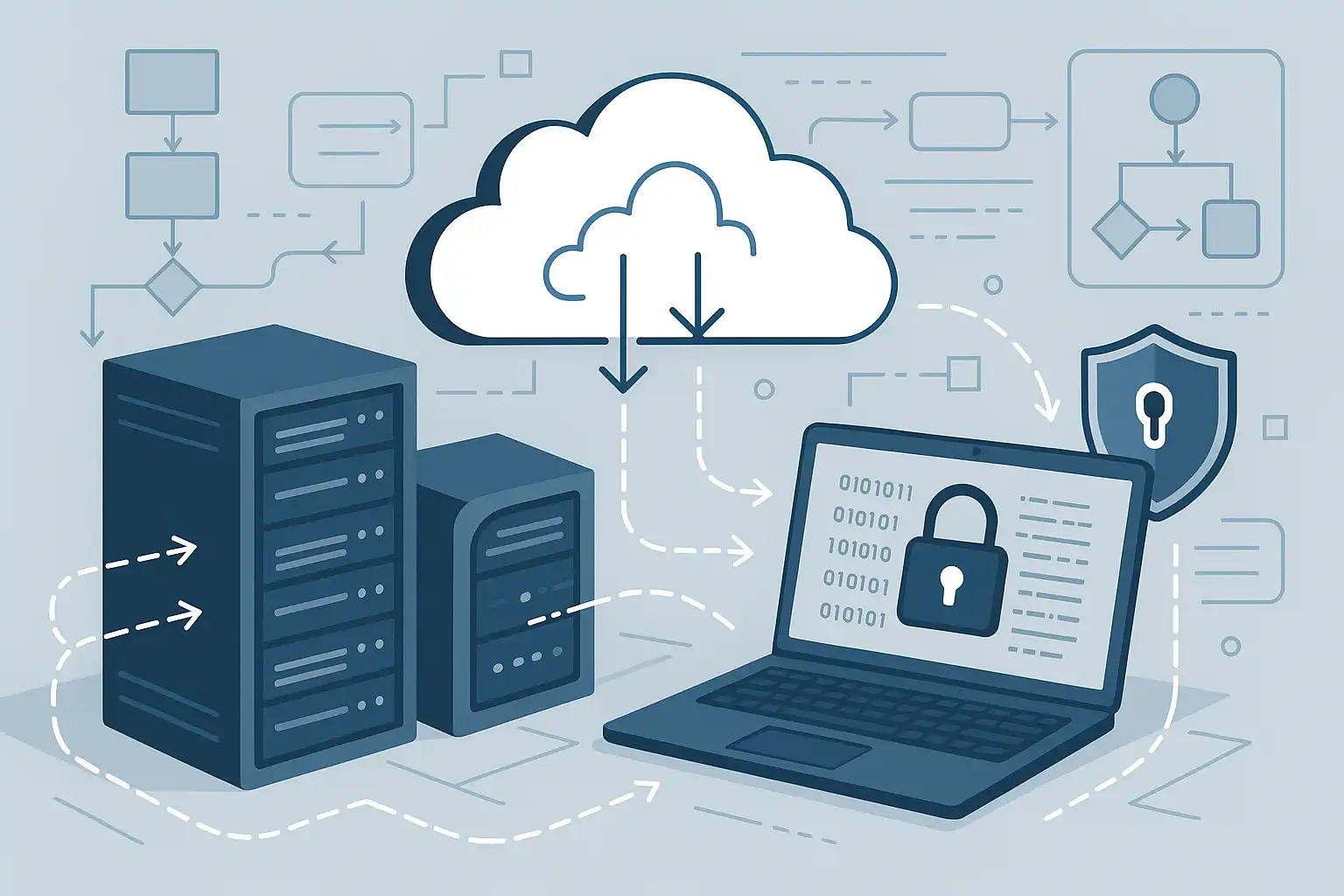
Are you planning to move your business data from old systems to new platforms? Data migration consulting offers the expertise and support needed to ensure your transition is safe, smooth, and successful. Right from the start, working with experienced consultants takes the guesswork out of the process and helps you avoid costly mistakes, downtime, and security risks. In this article, we explain how reliable data migration consulting minimizes risk, improves outcomes, and gives your organization peace of mind during even the most complex data migrations.
What is Data Migration Consulting?
Data migration consulting is a professional service that guides organizations through the process of transferring data from one system to another. This can include moving information from on-premises servers to the cloud, upgrading to new software platforms, or consolidating databases after company acquisitions. The goal is always to ensure data integrity, security, and minimal disruption to daily business activities.
Consultants use proven best practices to plan and execute each step. They work closely with your teams, identify potential risks, and offer solutions tailored to your specific business needs. Whether you are a small business or a large enterprise, leveraging expert guidance means you are less likely to encounter surprises during migration and more likely to meet your project’s goals on time and on budget.
How Does Expert Guidance Reduce Risk in Data Migration?
Data migration projects involve moving vast amounts of information. Without proper planning, you risk data loss, downtime, or even security breaches. Expert consultants minimize these risks through a detailed and structured approach.
Key Benefits of Data Migration Consulting
- Thorough Assessment: Before starting, consultants carefully review your existing systems and data. This early assessment reveals hidden compatibility issues or security vulnerabilities.
- Custom Migration Planning: Experts design a clear, step-by-step plan tailored to your needs. They map out phases, timelines, and responsibilities to avoid confusion or delays.
- Data Integrity & Security: Protecting your data is a top priority. Consultants use secure processes and tools to ensure nothing is lost or compromised during the move.
- Compliance Assurance: Many industries have strict data privacy and protection regulations. Professionals help you stay compliant, reducing the risk of legal or financial penalties.
- Minimized Downtime: By planning efficiently, consultants limit system downtime, so your business keeps running smoothly.
- Cost Control: A clear plan helps you avoid unexpected expenses and keeps your migration project within budget.
What Steps Do Consultants Take for a Safe Data Migration?
The migration process is more than just copying files from one place to another. Trusted consultants follow a methodical approach to keep your data safe and your operations uninterrupted:
- Initial Assessment: Review current data and systems to spot risks, limitations, and opportunities for improvement.
- Strategy Development: Develop a detailed migration plan, including timelines, resources, and security requirements.
- System Integration: Ensure your new and old systems can communicate. This might involve setting up connections or APIs for smooth data flow.
- Data Profiling and Analysis: Examine your data to identify errors, duplicates, or outdated information. This step helps improve data quality before migration.
- Mapping and Transformation: Define how data will move from old formats to new ones, making necessary changes to match new system requirements.
- Migration Execution: Move the data in phases with ongoing monitoring and validation to catch errors early.
- Error Handling: Use automated tools to flag and fix any data issues that arise during the process.
- Validation and Testing: Verify that all data was transferred accurately and securely, and ensure systems function as expected in the new environment.
- Post-Migration Support: Offer continued monitoring and troubleshooting to address any issues after migration is complete.
Tools and Technologies Used
Data migration consultants employ specialized tools such as Microsoft Azure Data Factory, AWS Database Migration Service, and Talend. These tools enable secure migrations, automated error checking, and seamless integration between cloud and on-premises systems. Consultants also use encryption and data masking tools to protect sensitive information during and after the move.

Why Choose Professional Data Migration Consulting?
Choosing a skilled consultant saves time, reduces frustration, and lowers the risk of failed migrations. Experience with complex projects means consultants have encountered and solved a range of migration challenges. They bring knowledge of NLP and Computer Vision Experts, modern analytics, and industry-specific compliance requirements to each project, ensuring your organization is prepared for the future.
When Is Consulting Especially Valuable?
- You are migrating sensitive or regulated data, such as financial, health, or customer records.
- You have large or complex data environments, with multiple databases and applications.
- Your business cannot afford significant downtime or data loss.
- You need to upgrade from outdated legacy platforms to modern, cloud-based solutions.
Even in smaller migrations, outside guidance helps organizations avoid hidden traps and learn best practices for future projects. Consultants not only deliver a safe migration but also leave your team with improved processes and documentation.
What Are the Risks of DIY Data Migration?
It may be tempting to attempt migration without expert help. However, this approach exposes you to various risks, such as:
- Data Loss: Mistakes in mapping or extraction can result in missing or corrupted information.
- Extended Downtime: Without careful planning, upgrades take much longer, interrupting daily operations.
- Security Incidents: Sensitive data may be exposed or breached if proper protections are not in place.
- Cost Overruns: Unanticipated issues often drive up migration costs well beyond original estimates.
- Compliance Failures: DIY migration can miss critical legal or regulatory requirements, resulting in penalties.
Businesses switching to the cloud especially benefit from cloud data migration consulting services, which address unique cloud security, scalability, and integration needs.
How Data Migration Consulting Supports Long-Term Success
Beyond the immediate project, consultants can help organizations adopt enterprise data migration best practices and modernize their IT strategies. This includes improved disaster recovery, more accessible analytics, and better use of cloud resources. If you’re interested in how experts can help teams work together efficiently and share domain knowledge, consider learning more about a data science collaboration platform that connects skilled professionals.
What Should You Look for in a Data Migration Consultant?
Choosing the right partner is key. Look for consultants with proven experience, strong customer references, and deep knowledge of your industry’s requirements. Good communication and transparency are essential, as is a track record of following secure data migration for businesses. Ask about their methodology, tools used, and support offered after your migration is complete.
Providers should also be able to adapt their strategies to your specific situation. For example, a healthcare organization migrating patient records has different needs from a retailer consolidating inventory systems. Customization makes a real difference in achieving a smooth, low-risk transition.

FAQ
Q: How do consultants ensure our data is not lost or changed during migration?
A: Consultants follow a step-by-step cloud data migration process with quality checks, automated error detection, and extensive validation before, during, and after the move. These steps help preserve data accuracy and consistency throughout the project.
Q: Can expert guidance help with regulatory requirements?
A: Yes, consultants are familiar with compliance standards in finance, healthcare, and other sectors. They design strategies to keep your data safe and compliant with regulations such as GDPR or HIPAA.
Q: What kind of support can we expect after the migration?
A: Most consulting teams offer post-migration monitoring, troubleshooting, and support to address any issues. They help your staff adapt to new systems and make sure everything continues running smoothly.
Q: Are consulting services only for large companies?
A: No, businesses of all sizes benefit from data migration risk reduction strategies. Consulting services scale to fit your needs and budget, whether you are a small business moving a single database or a global enterprise consolidating complex systems.
In summary, data migration consulting provides the expertise, structure, and support needed to protect your business as you move data to new platforms. With a clear plan and the right help, you can reduce risk and unlock new potential for your organization.
